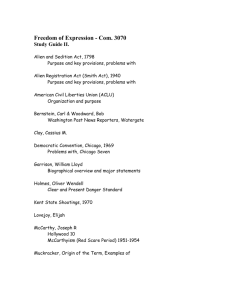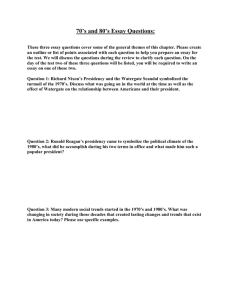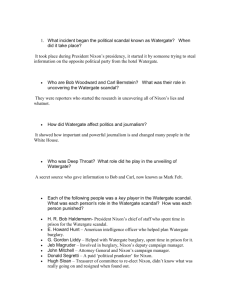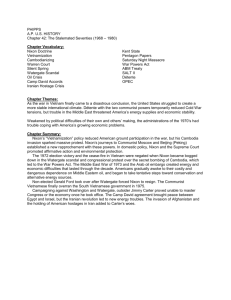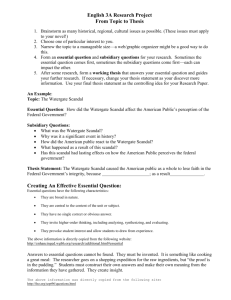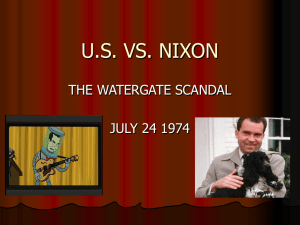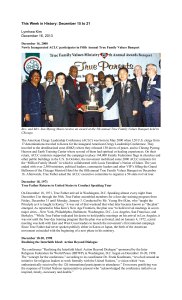Nixon & Watergate (1960s
advertisement
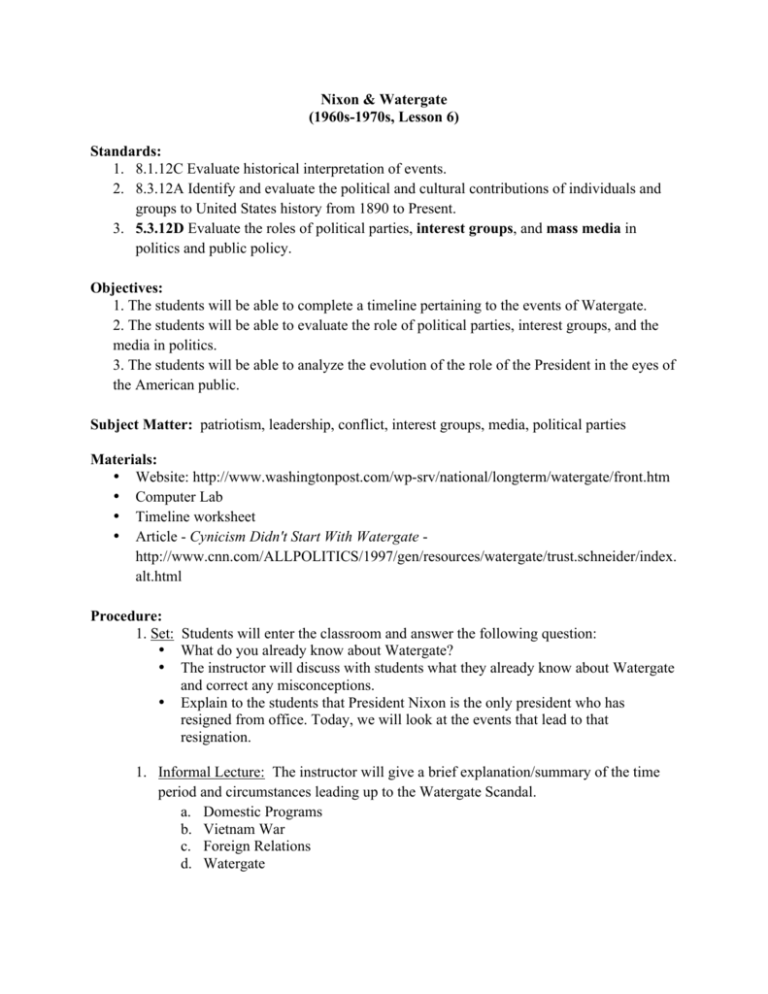
Nixon & Watergate (1960s-1970s, Lesson 6) Standards: 1. 8.1.12C Evaluate historical interpretation of events. 2. 8.3.12A Identify and evaluate the political and cultural contributions of individuals and groups to United States history from 1890 to Present. 3. 5.3.12D Evaluate the roles of political parties, interest groups, and mass media in politics and public policy. Objectives: 1. The students will be able to complete a timeline pertaining to the events of Watergate. 2. The students will be able to evaluate the role of political parties, interest groups, and the media in politics. 3. The students will be able to analyze the evolution of the role of the President in the eyes of the American public. Subject Matter: patriotism, leadership, conflict, interest groups, media, political parties Materials: • Website: http://www.washingtonpost.com/wp-srv/national/longterm/watergate/front.htm • Computer Lab • Timeline worksheet • Article - Cynicism Didn't Start With Watergate http://www.cnn.com/ALLPOLITICS/1997/gen/resources/watergate/trust.schneider/index. alt.html Procedure: 1. Set: Students will enter the classroom and answer the following question: • What do you already know about Watergate? • The instructor will discuss with students what they already know about Watergate and correct any misconceptions. • Explain to the students that President Nixon is the only president who has resigned from office. Today, we will look at the events that lead to that resignation. 1. Informal Lecture: The instructor will give a brief explanation/summary of the time period and circumstances leading up to the Watergate Scandal. a. Domestic Programs b. Vietnam War c. Foreign Relations d. Watergate 2. Timeline Activity: a. Students will use the multimedia website http://www.washingtonpost.com/wpsrv/national/longterm/watergate/front.htm to create a timeline of the events prior to, during, and following the Watergate scandal. b. This activity is to be collected and graded upon its completion. 3. Article: The instructor will hand out “Cynicism Didn't Start With Watergate.” a. Students will be expected to read the article and write a response to the following question. • How did the Watergate Scandal impact the public’s view of our government? b. Students will be asked to share and hand in their responses to the article “Cynicism Didn't Start With Watergate.” 4. Close: Answer the question: Should President Nixon be remembered as a good or a bad president? Why? Assessment: 1. The instructor will informally observe the students completing the set and participating in the class discussion. 2. The instructor will formally evaluate the students by collecting the timeline and article responses. Cynicism Didn't Start With Watergate But the scandal has had a long-lasting impact on public confidence in government By Bill Schneider/CNN WASHINGTON (June 17) -- What's been the most powerful force in American politics for the last 25 years? In a word, it's cynicism. Americans have come to believe the worst about government, politics and politicians. It didn't start with Watergate, but Watergate turned an erosion of public confidence into a collapse. Remember when government worked and Americans trusted their leaders? No? Then you must be too young to remember the Eisenhower and Kennedy eras. The federal government had rescued the country from the Great Depression. It had won a world war. And it was using its power to bring about social justice in America. Kennedy was the last president of that golden era. "The energy, the faith, the devotion which we bring to this endeavor will light our country and all who serve it, and the glow from that fire will truly light the world," Kennedy declared. Polls taken in 1958 and 1964 showed three-quarters of Americans believed they could trust the government in Washington to do what was right. Three quarters. Imagine! In 1965, everything began to fall apart. There was the escalation of the Vietnam War, a wave of campus protests, and a race riot in Los Angeles. Government could not cope. Public trust began to erode. The percentage of Americans who said they trusted the government in Washington fell to 65 percent in 1966, 61 percent in 1968, and 53 percent in 1970. The downturn came to a climax with Watergate. Americans saw a presidency disintegrate before their eyes, criminal conspiracies at the highest level of government and a president driven out of office. The effect on public trust was immediate and dramatic. Watergate crushed the public's faith in government. In 1974, a little more than a third of Americans -- 36 percent -- said they still trusted the government. Since Watergate, nothing has happened to restore public trust. In the 1970s, the economy began a long period of deterioration. We suffered military humiliation, first in Vietnam, then in Iran. Not only did government fail to solve those problems, but people believed government caused problems like inflation. Ironically, the collapse of confidence in government gave Republicans a big opportunity. After all, they're the party that claims government doesn't work. By 1980, Americans believed it, and elected Ronald Reagan. The Reagan economic boom had the unintended consequence of boosting trust in government, which rose to 44 percent in 1984, but nowhere near where it used to be. And only until the next recession. Right now, times are pretty good. The economy is booming. Crime is down. The U.S. is the world's only superpower. What's happening to public trust? It's up -- to 32 percent. That's nowhere near where the country was before Watergate. In fact, it's just about where the country was after Watergate. As the saying goes, "Been down so long, it looks like up to me." Watergate also heightened public contempt for professional politicians and created a market for outsiders and non-professionals, like Jimmy Carter, Reagan, Ross Perot and Colin Powell. People expect them to rescue the country from all that cynicism.
